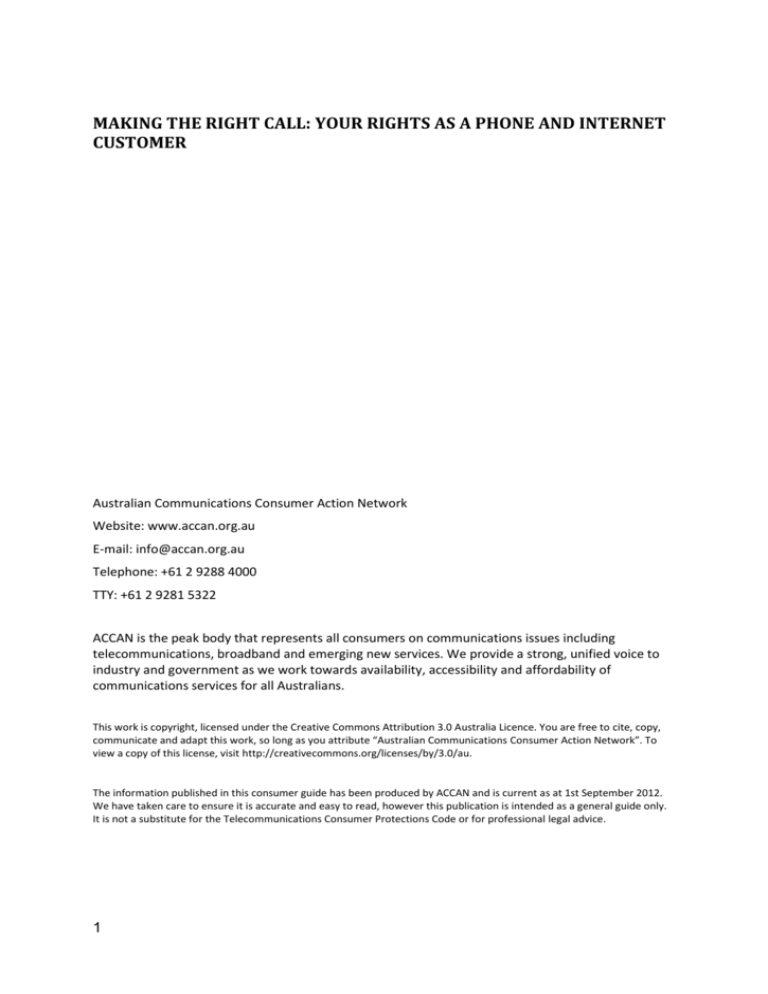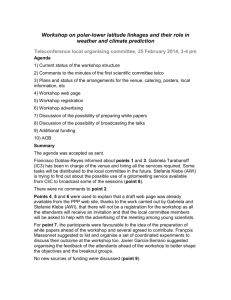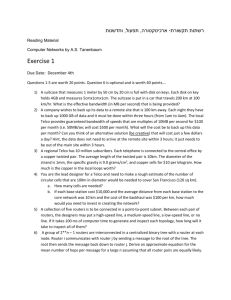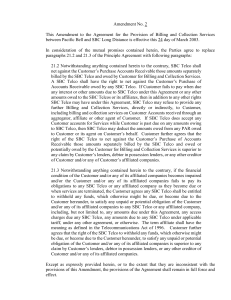Making the Right Call: Your Rights As a Phone and Internet
advertisement

MAKING THE RIGHT CALL: YOUR RIGHTS AS A PHONE AND INTERNET CUSTOMER Australian Communications Consumer Action Network Website: www.accan.org.au E-mail: info@accan.org.au Telephone: +61 2 9288 4000 TTY: +61 2 9281 5322 ACCAN is the peak body that represents all consumers on communications issues including telecommunications, broadband and emerging new services. We provide a strong, unified voice to industry and government as we work towards availability, accessibility and affordability of communications services for all Australians. This work is copyright, licensed under the Creative Commons Attribution 3.0 Australia Licence. You are free to cite, copy, communicate and adapt this work, so long as you attribute “Australian Communications Consumer Action Network”. To view a copy of this license, visit http://creativecommons.org/licenses/by/3.0/au. The information published in this consumer guide has been produced by ACCAN and is current as at 1st September 2012. We have taken care to ensure it is accurate and easy to read, however this publication is intended as a general guide only. It is not a substitute for the Telecommunications Consumer Protections Code or for professional legal advice. 1 INTRODUCTION: Your rights as a phone and internet customer As a telecommunications customer, you have rights that apply to your: 1. 2. 3. 4. mobile phone service landline phone service internet service pay TV service if it is through a telecommunications provider (telco) This document provides a summary of these basic rights as outlined in the Telecommunications Consumer Protections Code and other relevant laws, regulations and industry codes. If you have an issue with your phone or internet service, you should contact your provider. If you are not able to resolve the problem, you should make a complaint to the Telecommunications Industry Ombudsman (TIO) either online at www.tio.com.au, by phoning 1800 062 058 or (TTY) 1800 675 692. The TIO is a free and independent service. Symbols in this brochure: means you should contact your telco for more info. means information which is useful for everyone, but may be particularly helpful to people with disability. 2 1. Before you sign up or buy Advertisements It’s important to look at ads carefully, especially the small print. Advertisements, whether they are posters in stores, in magazines, or on TV, must be accurate and not misleading. They must tell you the real total price you will pay. The rules about how telcos can advertise their products will become stricter from 27 October 2012. Some of these new rules are: 1. 2. 3. If a newspaper or magazine ad for a mobile phone or mobile broadband has headlines claiming that calls or data are “included” in a plan, the ad must also tell you how much each of these are worth in the plan: 1. a two-minute national call 2. an SMS (text message), and 3. one megabyte of data. Ads can’t use words like ‘unlimited’ or ‘no exceptions’, unless that’s really true. And they can’t use the word ‘cap’ unless they’re referring to a service with a maximum limit on the amount of money you pay each month. If you buy a phone and contract package, the ad can’t say that the phone is ‘free’ – because you’re actually paying it off over the term of your contract. Questions you should ask 1. How much data and how many texts/local calls are included? 2. Are national or international calls included? 3. What is the minimum amount you will have to pay over the length of the contract? 4. What equipment will be provided and is there an additional charge? 5. Does the telco have coverage where you live, work and travel? 6. What happens if you exceed your download limit? Will you be charged more? Will your service be suspended? Will you receive a warning? 7. How much will you have to pay to make calls or use the internet if you go overseas? 8. How long will it take for your new service to be connected? 9. What happens if you want to change suppliers? 10. Will it cost extra to have an unlisted or silent number? From March 2013, telcos will have to follow new rules about what information they give you. Information before you buy: The Critical Information Summary (CIS) From 1 March, 2013, telcos must give you a Critical Information Summary (CIS). The CIS tells you key things you need to know about a particular product or service. The CIS must include: 1. A description of the service or product with details like what is included and excluded 2. Pricing information, such as minimum and maximum charges 3. How much you will have to pay if you end a contract early 4. How to contact customer service. If you’re interested in a particular product or service, you can get the CIS by: 1. Going to the telco’s website 2. Ringing the telco and asking that the CIS be emailed or posted to you 3 3. Getting it at a shop. A CIS may be useful but it may not include all the information you need. It can be worth checking a telco’s website, phoning, or visiting a store for more information. You might need more detailed information, especially about warranties; billing and payment arrangements; call, text or data charges if you go overseas; or what data allowance is best for you. Coverage – How good is your telco’s signal? Telcos need to provide you with accurate information about their network coverage. This is important because you don’t want to sign up to a service if you won’t get reception in the areas you live, work and travel through. Telcos aren’t allowed to say they have network coverage in an area unless they really do. Coverage includes mobile broadband, mobile voice use, even access to TV. Note that a particular telco’s coverage in an area might be good for voice use but not for data use. Check the coverage map on the telco’s website or at their store before choosing a product or service. What product is right for you? Even the most tech-savvy people can find it hard to figure out which product is right for them What are prepaid mobile services? 1. You buy a phone handset separately or already own one 2. You buy credit to pay for calls and services 3. Once you've used up your credit, you can receive calls but you can’t make any more calls until you buy more credit (unless you have arranged an automatic top-up). What are post-paid mobile services? 1. You sign a contract, usually for 12 or 24 months, agreeing to a minimum payment each month 2. A new mobile phone handset is often included in this price 3. If you use more than the ‘included’ amount of data, calls or SMS, you have to pay extra (unless your service is ‘unlimited’) 4. If you end the contract early, you will have to pay cancellation charges You can always call Triple Zero Emergency, even if you have run out of mobile credit. Mobile product or service When trying to decide what mobile product or service is right for you, think about: 1. Do you already have your own phone handset? Do you need to upgrade? 2. Do you want a prepaid or a ‘post-paid’ (contract-based) service? 3. How much will you be using the service? Many telcos will let you ‘bump up’ to a more expensive plan during the term of your contract, but will charge you cancellation fees to go onto a cheaper plan. 4. Do you want to be able to access the internet when you’re out and about? 5. Do you have trouble controlling your spending? Prepaid is generally an easier to way to manage your spending because once you use up your credit, you can’t do anything until you 4 6. ‘top up’. Some telcos will give you the option of automatically topping up using your credit card. Think carefully about whether this is right for you. How many calls and texts would you usually make in a month? How much data would you use? Different plans offer different advantages in terms of the amount of calls, texts and data. A good way to find a plan that will suit your usage pattern is to look at your old bills. Home Internet Product When trying to decide what home internet product is right for you, think about: 1. What types of internet services are available to you? (for example ADSL, ADSL2+, cable, naked DSL, wireless, mobile broadband, satellite) 2. Which type of internet service would best meet your needs in terms of speed and monthly data allowance? Watching a one minute video online uses around 5 megabytes (MB) of data; downloading a TV show uses around 350 MB; having a one-hour Skype video chat uses around 170 MB. 3. Do you want phone and internet? Find out whether ‘bundling’ (getting all the services from the same telco) could save you money – but make sure that all the services meet your needs, otherwise you could end up spending more than you need to. ACCAN tip sheets For more tips on choosing broadband, mobile phone and home phone services see www.accan.org.au/tipsheets or contact ACCAN to have these posted to you. If you have a disability, the telco must give you information about what products and services would best meet your needs. If you’re in the market for a mobile phone, you should also check out www.mobileaccessibility.info for information on which handsets are best for you. 4. Signing up or buying The sales representative 5 Telco sales reps, whether on the phone or in the shop, must: 1. Describe products and services accurately, in a way you can understand, and not leave out important information 2. Get your consent before you sign a contract (including making sure you are legally able to sign a contract) 3. Tell you if a phone call between you and them is being recorded 4. Tell you where you can get more information if you need it 5. If they won’t sell you a service or product, they must tell you why not 6. Be able to communicate in English 7. Be polite Sales representatives should also know how to communicate with and meet the needs of disadvantaged or vulnerable people, including people with disability. If asked, they must tell you which products will suit you, and how those products work. The contract If you buy a post-paid service, you will be asked to sign a contract. Telcos must make contracts available on their website, and must make the contract as easy as possible for you to understand. Standard contracts must not include any “unfair terms”, which means that your telco cannot: 1. 2. 3. 4. 5. Suspend your service because of their mistake Charge you for anything which is their mistake Renew or extend your contract, unless you agree Change your contract, unless you agree Break the Australian Consumer Law. Your contract must say what happens after you have used up the included value in your monthly plan – whether your connection speed is slowed, your service is suspended until the next billing period, or you are charged for excess calls/texts/data. Charges for calls/texts/data which are above your included value can be much higher. The Australian Consumer Law The Australian Consumer Law (ACL) covers all Australian businesses. Under the ACL, the products and services you buy should work as expected, match any description provided and include any features a salesperson promised you. If this is not the case, you have the right to redress (such as a refund or replacement). For more information on the ACL, see www.consumerlaw.gov.au. What to look for Many people don’t read all the small print in their contract, but here are some things you need to look out for: 1. How many months will the contract run for? 2. What are the penalties if you end the contract early? 3. If you move house, will you need to pay fees and charges? 6 4. 5. 6. How flexible is the contract? Can you decide to go onto a higher or lower plan if you want to, without penalty? How often will you receive a bill? Will your bill arrive by email, mail or will you need to view it online? After you’ve signed up or bought Customer service 7 Not all telcos are equal when it comes to providing good customer service, but all telcos are required to: 1. Deal with your enquiries quickly and effectively 2. Try to resolve any problem the first time you contact them 3. Protect your personal information You have the right to have someone else (like your partner, friend or parent) deal with the telco on your behalf. Just ask the telco for information about ‘appointing an authorised representative’. Billing In most cases, having a contract means the telco must regularly provide you with a bill. Your telco must: 1. Make sure that your bills are easy to read and understand 2. Provide you with itemised billing details if you ask for it 3. Give you billing information for the last six years if you ask for it 4. Not charge you for a timed call on your mobile if you ring them to get billing information (but if you are calling from a mobile phone which is with another provider, you will have to pay normal mobile call charges) 5. Make sure that there is at least one way for you to pay your bills without being charged a fee. The telco does not need to provide you with a bill if you have a pre-paid service or you have a postpaid service and: 1. You pay by direct debit, AND 2. The charges per billing period are the same as the minimum monthly amount in each billing period, AND 3. You have agreed that you won’t get a bill unless the bill is more than 10% higher than the minimum monthly amount. Spend monitoring tools: Don’t end up spending more than you planned. Some of the ways you can monitor your spending are: 1. Check by logging into your telco account online 2. If you have a smartphone, you can use apps such as Onava, Data Monitor Widget and DataMan 3. Some smartphones have a built-in data counter (but these will monitor data only, not voice calls or texts) 4. Call your telco to ask for an update. Be aware that the information on some monitoring tools might not be up to date. New rules about usage notifications from September 2013 Your telco will soon have to notify you about how much of your included monthly value you have used so far, using voice calls, texts or data. There are different ways your telco can notify you - in an SMS, email, or online. 8 Depending on what service you have, your telco might notify you when you reach 50%, 80% and 100% of your expenditure or data allowance. The notifications must be free and made no later than 48 hours after you reach those usage points. Your telco will also notify you of any charges that you will have to pay if you use more than your included value or data allowance. This information won’t include calls or data that you use when you are overseas or texts that you send from Australia to overseas. Usage monitoring tools are ways for you to find out how much of your ‘included’ data, calls or texts you’ve used. Your telco must: 1. Provide information on its website about which usage monitoring tools you can use 2. Tell you how up-to-date the usage monitor is 3. Let you opt out of getting notifications if you want to Aside from notifications, your telco must offer you at least one other ‘spend management tool’. Some examples are: 1. Call barring or restricted access – where all or some outbound call types are barred (except for Triple Zero), but you can still receive calls 2. ‘Hard’ caps (where you are not able to spend more than the cap, until the next billing period) 3. Limiting your broadband speed (or ‘throttling’) after you’ve reached your data limit. When? 1. Starting 1 September 2013, all telcos must send customers notifications about their data use. 2. Also starting 1 September 2013, large telcos must send customers notifications about their voice calls and SMS use with small telcos required to do the same from 1 September 2014. 9 3. If something goes wrong... You have the right to make a complaint to your telco. Your telco must have a complaint handling procedure for communicating with you and fixing problems. Here’s what you should expect: 1. Your telco must try to resolve your problem fairly, without taking too long - urgent complaints must be resolved within two days; non-urgent complaints must be resolved within three weeks. 2. Your telco must ask you if you are happy with its proposed solution to the problem. If you are happy with it, then the telco must do what it promised within 10 working days of your response. 3. If you are not happy with the proposed solution, or if the complaint is taking too long to work through, your telco must offer to have your complaint referred to a supervisor or manager. 4. If you are still not happy with how your telco has handled your complaint, your telco must give you information about how you can complain to the Telecommunications Industry Ombudsman. 5. Your telco is not allowed to start debt collection procedures on a bill if you are in the process of disputing it with your telco or the TIO. 6. Your telco’s complaint handling procedure must be available for free and it must be easy to understand. For information on the best ways to make a complaint that gets heard visit www.accan.org.au/makeacomplaint or, for the Easy English version, www.accan.org.au/makeacomplaintEE The Telecommunications Industry Ombudsman (TIO) The TIO is a free, independent service which helps consumers (including small businesses) resolve complaints about phone or internet services. The TIO can help you with issues such as: 1. Billing and payments 2. How your telco manages your debts with them 3. Customer service 4. Technical faults 5. Connection problems 6. How your telco handled your original complaint. Before you contact the TIO, you need to try to resolve the problem directly with your telco. You should take your complaint to the TIO if: 10 1. 2. 3. Your telco is taking too long to resolve the complaint You are not satisfied with the way your telco offers to fix the problem Your telco does not do what it says it will do to fix the problem. You can make a complaint to the TIO in many different ways: 1. Complete the online form at www.tio.com.au 2. Call 1800 062 058 3. Post your complaint to PO Box 276, Collins Street West, VIC 8007 4. Fax the TIO’s consumer complaint form (available at their website) to 1800 630 614 The TIO is very disability-friendly and will happily accept complaints made through the National Relay Service (www.relayservice.com.au) or interpreters. Bill shock ‘Bill shock’ is when you get a bill that is significantly higher than you expected. The bill might be so high that you will have difficulty paying it. To avoid bill shock: 1. Remember that using your service overseas (‘global roaming’) can be extremely expensive. See ACCAN’s tip sheet (www.accan.org.au/roaming) before using your phone or broadband service overseas. 2. If your phone has Wi-Fi, set it up to connect automatically to your home or office Wi-Fi connection and look for free hot spots when you’re out. 3. Use spend management and usage monitoring tools 4. Think carefully before signing up to a prepaid service that automatically ‘tops up’ by taking money from your account 5. Think carefully about signing up to any service that charges extra once you’ve exceeded your included value or data allowance 6. If you use mobile broadband or a smartphone, see www.accan.org.au/mobiledata for more tips on how to avoid bill shock. If you think you have been overcharged or did not receive your usual usage notifications, contact your telco. If you can’t pay your bill This can happen for lots of reasons. Your telco has to tell you about its financial hardship policies, before or when it issues your first bill. Financial hardship policies explain how the telco will help you keep your service and pay off your bill over time. If you can’t pay your bill, don’t panic but don’t ignore it. Every telco has a hardship policy which it must make available when you start receiving your bills. Contact the telco to talk through your options – it is often possible to agree to a payment plan or come to another kind of other arrangement. Ask that the telco not charge you a late payment fee. 11 Your telco can disconnect, suspend or restrict your service if you don’t pay your bill. In most cases your telco has to warn you in writing at least twice, and at least five working days before it disconnects the service. If your service is disconnected, suspended or restricted, you can ask your telco to review the decision. In most cases, even if your phone service is disconnected, suspended or restricted, you will still be able to call Triple Zero (000) if you have an emergency. If you often find it’s hard to pay your bill, or have other bills which are causing you problems, you might want to talk to a financial counsellor, who can help you manage your money. Call 1800 007 007 or go to www.financialcounsellingaustralia.org.au to find a free financial counsellor. Ending your contract If you have a post-paid service, think very carefully about ending your contract early, because telcos are allowed to charge you penalty or cancellation fees if you do. Some providers will charge you fees if you move house or premises. If you decide to move to another telco, your old telco must tell you how much notice you have to give, and what fees and charges you’ll have to pay if you end your contract early. The new telco must tell you that you might have to pay fees or charges to your old telco (but you’ll need to speak to your old telco to find out how much you may be charged). The new telco must also: 1. Explain that you are entering into a new contract (if it’s a post-paid service) 2. Make sure that you are the account holder or have been authorised by the account holder 3. Tell you when the transfer will happen, and if there will be any interruptions to your service during the transfer 4. Tell you once the transfer has been completed, preferably on the same day as the transfer. If you are ending your contract because you are unhappy about the service your telco has given you, consider making a complaint to the telco, or taking your complaint to the TIO. You might find that you will be allowed to end the contract without paying any fees or charges – or that your telco offers you a better deal so that you will stay with it. Remember, you have the right to receive a service that works as advertised. Even if you don’t think you are ending your contract early – for example, if you want to keep the service but move on to a lower plan – your telco might consider that a ‘termination’ of your original contract, and charge you cancellation fees. Talk to your telco about any fees it will charge you before you request any changes to your service. For information about whether and how you can keep your old mobile or home phone number when switching services visit www.acma.gov.au and search for “number portability”. 12 Glossary Bill shock When you get a bill that is more costly than you expected Contract The document you sign with a telco, that both you and the telco have to follow Coverage How good your telco’s signal is in the places you want to use your device Critical Information Summary (CIS) A document which tells you what you need to know about a particular product or service (see Section 1 for more information) Data The websites, music, videos etc that you use on the internet Mobile broadband A way of using the internet from a mobile phone or other portable computer (like a laptop or tablet) Notifications Alerts your telco must sent you (after September 2013) to tell you how much of your monthly allowance you’ve used Text Short Message Service (SMS) or Multimedia Message Service (MMS), a text message that you send or receive on a mobile phone Spend monitoring tools Telco Ways of finding out how much of your monthly allowance you’ve used Telecommunications Industry Ombudsman (TIO) A free, independent service which helps consumers (including small businesses) resolve complaints about phone or internet services 13 A landline phone, mobile phone or internet service company






